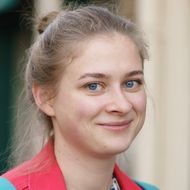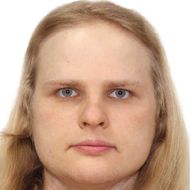- A
- A
- A
- ABC
- ABC
- ABC
- А
- А
- А
- А
- А
HSE University Holds First Independent Exams in Digital Skills
© Daniil Prokofyev/ HSE University
This year, 4,500 students from 40 undergraduate programmes across all HSE University campuses took independent exams in digital skills for the first time. The Data Culture Project has been running at HSE University since 2017, with the project focusing on giving graduates advanced digital skills, regardless of their specialization.
Currently, the Data Culture module includes three mandatory blocks: digital literacy, algorithm thinking and programming, and data analysis and artificial intelligence methods. Starting from 2022, every undergraduate must pass exams in these fields during their studies.
For each degree programme there is a minimum required level of digital skills which students must achieve. There are different modules within the structure of a degree programme: major, minor, Data Culture module, and others. Students develop their skills in data culture not only via the Data Culture module, but also when they study disciplines or carry out projects during their major, minor, and internship modules.
This means that students achieve the planned results by studying different elements and modules of their programme. This helps them to master tools and methods for working with data by solving tasks not only in the IT field, but also in their particular field of studies— from philology to design, from mathematics to geography.
For more information about the main blocks, please see the project webpage.
This year, for the first time, 1st-year students passed an independent exam in digital literacy.

Alexandra Alekhozhina
Head of Digital Skills Development Unit
From February 20th to March 25th 2022 we held the first independent digital literacy exams in Russian and English. In digital literacy, 84% of the students passed the exam, with 23% of them getting excellent grades. The overall results, as well as the results for each degree programme, show a normal distribution curve of grades, which we consider to be a very good sign. It means that the tools developed by the project team and verified by colleagues from HSE Institute of Education work correctly on big data. Some of the students took the exam in English (if they study in English), and, of course, there were more accessible options for students with specific learning needs.

Olga Podolskaya
Head of the Data Culture Project
Initially the project was aimed at developing data skills only — hence the name Data Culture. Gradually, however, the concept has been transformed, and over the years, we have determined three blocks that all students acquire at one of three levels — elementary, basic or advanced. First is the block on digital literacy. This includes information, communication and technical literacy, and digital security — skills and information that are necessary for life, not only for a specific professional activity.
Secondly, algorithm thinking and programming. HSE University chose Python as a programming tool because it is relatively simple to learn and the most popular of the universal languages. And thirdly, we focus on data analysis and artificial intelligence methods. Students learn to analyze data, create and test hypotheses, and make decisions based on data.
We began in 2017 with a pilot launch focusing on particular disciplines within several degree programmes. Gradually, the concept has expanded to cover all degree programmes across our campuses, and now more than 30,000 students a year study courses on Data Culture.
A large number of teachers and experts are involved in the implementation of this Data Culture project, and about 60% of them are IT specialists. In order to involve teachers in the university environment, we conduct regular adaptation seminars on teaching skills, and also organize professional development programmes. Teachers and students from our partner universities are also involved in online Data Culture courses.

Dmitry Shirokov
Expert from the Digital Skills Development Unit
While creating our digital literacy exam, we turned to the best practices in both domain research and project management. Our exam is based on the the European DigComp framework and the ICDL digital skills certification models. We looked the experience of Russian education, in particular the universal FIPI codifiers and outstanding higher education programmes. We combined external experience with earlier research by the HSE Institute of Education and the Concept for Developing HSE University Students' Digital Skills. We can say that our exam combines advanced research and practice of measuring digital skills.
To ensure the quality of work, we have created and applied, together with the Institute of Education, a procedure for analysing the contents of the exam. Over a period of 18 months, we carried out five rounds of testing on the tool, each time carefully examining all the feedback received from IOE experts, improving the accuracy and providing students with a qualitatively high-level exam for each subsequent iteration.
We have created our own technology for checking practical tasks, and we can proudly state that we are among the first institutions in the world to create a comprehensive digital literacy exam that is fully checked automatically.
In addition to digital literacy, 45 students from the ‘Cell and Molecular Biotechnology’ undergraduate programme passed the exam on algorithm thinking and programming at the basic level.
The course was held in the first semester in a mixed format. ‘We took the online course ‘Python as a Foreign Language’ as the basis and supplemented it with biological examples at seminars. Towards the end of the course, we covered libraries for data analysis and specialized biological libraries that may be useful in the future. I really wanted to show the students that programming is not at all scary or boring,’ says Ksenia Deinichenko, the course teacher. ‘This is the second time we’ve conducted this course, and again it’s turned out very well. It’s really nice to get feedback from students, even a year after the course has finished, and to know that this knowledge is being actively applied in other disciplines, and someone is planning to build their career in bioinformatics.’

Vyacheslav Fyodorov
Student on the ‘Cell and Molecular Biotechnology’ Bachelor's programme
The Python course was a real discovery for me. The course has been intensive, but at the end of each week you realize that you’re getting more and more tools and your efforts are really paying off. The combination of an online course with on-site classes makes it convenient for studying, and the course content is user-friendly and detailed.
In the 4th module, students of 46 more programmes will take independent exams in digital literacy, as well as 10 in programming and 2 in pilot exams in data analysis.

